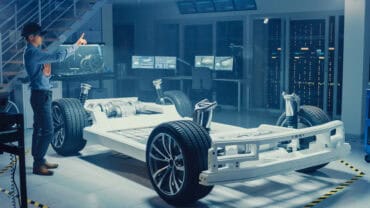
Explore how the EV industry is evolving towards sustainability by building on best practices, reducing waste, and embracing circular economy principles.
Sustainability remains a pivotal concern in EV manufacturing as demand grows and the environment changes. Manufacturers have a unique opportunity to redefine automotive production through sustainable practices all the way to something no one might have dreamed possible one hundred years ago—zero waste. It’s time to explore how the industry can build on current best practices in reducing waste and enhancing sustainability, progressing towards the ambitious goals of zero-waste production lines and a circular economy.
Current Best Practices in Reducing Waste and Enhancing Sustainability
Manufacturers have already started building in sustainability initiatives to help control costs and reach important ESG goals.
Lean Manufacturing Techniques
Lean manufacturing is integral to reducing waste without compromising productivity. Manufacturers can significantly reduce waste by streamlining processes, eliminating unnecessary steps, and optimizing resource use. For example, some companies employ advanced robotics and automated systems to ensure efficient resource use.
Advanced Waste Management Systems
Effective waste management systems are essential for recycling and repurposing materials. These systems enable the sorting and processing of waste, ensuring materials are reused rather than discarded. A plant could, for instance, recycle nearly all of its production waste, showcasing the potential for significant waste reduction through advanced systems.
Sustainable Material Selection
Choosing sustainable materials is a crucial step toward optimizing material use. This involves selecting materials that are recyclable, biodegradable, or sourced from renewable resources. Leading EV manufacturers are increasingly using lightweight and recyclable materials like aluminum and carbon fiber to reduce their vehicles’ environmental impact.
Moving Towards Zero Waste Production Lines
The ideal would be to eliminate waste altogether, which would help cut environmental pollution while also improving a company’s bottom line. Achieving zero-waste production lines requires integrating lean manufacturing techniques with advanced waste management practices. By combining these approaches, manufacturers can significantly minimize waste and create more sustainable production processes.
Design for Sustainability
Designing vehicles for easier disassembly and recycling is essential for sustainable manufacturing. Modular design allows parts to be replaced or upgraded without discarding the entire vehicle. This approach not only reduces waste but also extends the lifecycle of EVs, making them more sustainable.
Case Study: Renault’s Circular Economy Approach
Renault is an example of how companies can approach integrating circular economy principles into manufacturing processes. Their approach includes:
- Remanufacturing: Renault’s facility in Choisy-le-Roi, France, specializes in remanufacturing engines, gearboxes, and other components. By refurbishing and reusing parts, Renault significantly reduces the need for new raw materials and lowers overall production costs.
- Recycling: Renault has developed advanced processes to recycle materials from end-of-life vehicles. The company ensures that metals, plastics, and other materials are recovered and reused in new cars, minimizing landfill waste and maximizing resource efficiency.
- Eco-Design: Renault designs its vehicles with the entire lifecycle in mind, focusing on sustainability from the outset. This includes creating components that are easier to disassemble and recycle at the end of their lifecycle.
Renault’s initiatives demonstrate how a circular economy approach can lead to significant environmental and economic benefits by reducing the need for new materials, minimizing waste, and optimizing resource use.
See also: EV Automakers Must Prepare for the Technology Arms Race
Challenges and Solutions in EV Manufacturing Sustainability
Despite the progress and potential, EV manufacturers face several challenges in achieving sustainability goals. Here are some of the main challenges and potential solutions:
High Initial Costs
The transition to sustainable practices often involves significant initial costs. Investments in new technologies, materials, and processes can be prohibitive.
- Strategies for Mitigating Costs: Government incentives and subsidies can alleviate some financial burdens. Investing in research and development can also lead to cost reductions over time as technologies become more efficient and widely adopted.
Technological Barriers
Technological hurdles, such as advancements in battery technology and recycling processes, can impede progress.
- Solutions and Ongoing Research: Continuous investment in R&D is crucial. Collaboration with tech companies and research institutions can accelerate the development of innovative solutions.
Supply Chain Issues
Sustainably sourcing materials can be challenging, especially with the demand for rare earth metals and other resources.
- Approaches to Creating Resilient Supply Chains: Developing robust supply chain partnerships and investing in sustainable mining and recycling can enhance supply chain resilience. Transparent sourcing practices also build consumer trust and regulatory compliance.
Regulatory and Market Challenges
Navigating regulations and fluctuating market demands can complicate sustainability efforts.
- Adapting to Regulatory Requirements: Staying ahead of regulatory changes and engaging with policymakers can ensure compliance and influence favorable regulations. Market analysis and agile production practices can help manufacturers adapt to consumer preferences and market dynamics.
Integrating Best Practices, Zero Waste, and Circular Economy
Creating a holistic sustainability strategy incorporating best practices, zero waste goals, and circular economy principles can bring significant environmental and economic benefits. Companies that adopt these strategies often see cost savings through reduced material expenses and waste disposal costs, enhanced brand reputation, and increased consumer appeal.
The path to sustainable EV manufacturing requires a comprehensive approach that builds on current best practices, moves towards zero waste production lines, and embraces the circular economy. By implementing lean manufacturing techniques, advanced waste management systems, and sustainable material practices, EV manufacturers can lead the automotive industry toward a more sustainable future.







